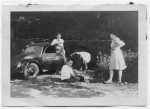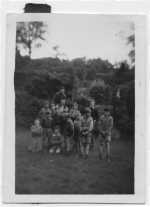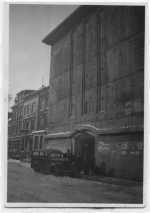Page
1 | Page 2 | Page 3 | Page
4 | Page 5 | Page
6
Henry
R. Baerg served as a conscientious objector in various national
parks and on a farm. Looking back, he can see the far-reaching effects
of CO service.
“Alternative
service during World War II played a greater role in our lives
than we realized at the time. It added significantly to development
in Mennonite history by impacting a whole generation of men who
became pastors of our churches, teachers in our colleges and leaders
in our conferences. They became men of evangelism and missions."
[ASP, 34-35]
David
Schroeder echoes Baerg's comments. Schroeder worked in St. Boniface
Hospital in Winnipeg for his alternative service. He is amazed by
the effect this service had on him and his fellow COs. “Of 35-40
COs who attended Bethel Church during that time,” he writes, “8
went into full-time Christian service. That's unbelievable. Being
together, having to stand up and fend for yourself, forced you to
encounter life in a different way.” [ASP, 160]
 David
Goerzen agrees that serving as a conscientious objector had a lasting
possitive impact on the Mennonite churches. David
Goerzen agrees that serving as a conscientious objector had a lasting
possitive impact on the Mennonite churches.
The
group of COs who attended Bethel Church do not seem to have been
unusual. Although no one has counted how many COs went into Christian
service after the war, we can guess that there were quite a few.
Henry R. Baerg remembers how camp life encouraged many COs to rededicate
themselves.
“I
took along a few books and my Bible for preaching and study purposes.
Later, some men took up serious studies, even finishing high school
by correspondence and enrolling in university courses or engaging
in group studies. We might have been helped by some guidance as
to study courses, more profitable studies and academic or educational
training. Most of us benefited from the inter-church association
and fellowship. We cultivated our own spiritual lives and learned
from each other how to develop good devotional habits. By being
responsible for much of our nurture, we learned leadership responsibilities,
grooming some prospective preachers and pastors. We received spiritual
nurture through chaplaincy and had regular Sunday worship. Our
camp chaplains did some of the preaching, but since they had to
serve a number of camps, we did a lot of preaching, teaching,
leading Bible studies and prayer meetings. Many COs went on to
Bible College after release from ASW and became pastors and teachers.
Since several of the men in ASW were not believers, it gave us
opportunity to witness. Some came to full assurance of faith and
we all grew and gained greater knowledge of the truth."
[ASP,
34-35]
Along
with this new-found truth came a desire to put it into action. The
CO experience reminded Mennonites that it was necessary to put their
beliefs into action. Instead of pulling away from the world, the
post-war Mennonites engaged the world. They realized that being
a CO was more than not fighting. Being a CO meant working for peace.
COs didn't always think their alternative service in Canada was
doing much good. After they were released, they had more opportunities
to work actively for peace. Norman R. Weber volunteered as soon
as he was able.
“Soon
after the war, I answered the call of the United Nations Relief
and Rehabilitation Association and volunteered to work on a relief
ship carrying horses and relief goods to Poland and Finland. The
adventure that started when I left southern Ontario September
2, 1946 and was supposed to last 4-6 weeks, stretched into four
months. We had a stormy crossing and lost horses to the rough
waves of the North Atlantic. We walked among the corpses in Polish
battlefields and were shipwrecked in the Gulf of Finland …. I
saw first hand, the traumatic experiences brought on by World
War II.” [ASP, 208]
 |
 |
 |
| Workers with the Mennonite Relief Service in Europe |
George Neufeld and Vernon Toews served in an English orphanage |
Mennonite Central Committee's warehouse in Luebeck, Germany.
|
For
many COs , their wartime duties encouraged a lifetime of service.
Page
1 | Page 2 | Page 3 | Page
4 | Page 5 | Page
6 |


